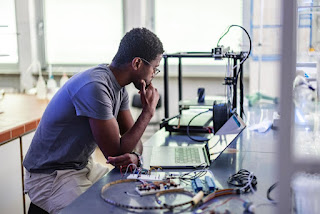Fostering Creativity and Innovation in Education: Promoting Critical Thinking and Problem-Solving Skills
Introduction
In the dynamic landscape of education, fostering creativity and
innovation has become increasingly important. By nurturing these skills,
educators can empower students to think critically, solve complex problems, and
adapt to the demands of the future. This article explores the benefits of
fostering creativity and innovation in education, with a particular focus on how
it can provide online exam help to students.
The Benefits of Fostering Creativity and Innovation
Fostering creativity and innovation in education offers a range
of benefits for student's academic and personal development:
Enhanced critical thinking and analytical skills:
Encouraging creative thinking nurtures students' ability to think critically, analyze information, and evaluate multiple perspectives. These skills are crucial for successfully navigating online exams that require thoughtful analysis and interpretation of questions.
Development of problem-solving abilities:
Creativity and
innovation foster a problem-solving mindset. Students equipped with these
skills are better prepared to approach complex exam questions and develop
effective strategies to overcome challenges encountered during online exams.
Increased adaptability and resilience:
Creativity and innovation
promote adaptability and resilience, enabling students to respond flexibly to
changing circumstances. This is particularly valuable in the context of online
exams, where unexpected challenges may arise.
Promotion of out-of-the-box thinking and originality:
By
fostering creativity, educators encourage students to think beyond conventional
boundaries and explore unique solutions. This mindset cultivates originality
and helps students stand out in their online exam responses.
Preparation for the demands of the future workforce:
Creativity
and innovation are highly valued in the modern workforce. By nurturing these
skills, educators equip students with the ability to thrive in an increasingly
dynamic and innovative work environment, where online exams are just one aspect
of their professional journey.
Strategies for Fostering Creativity and Innovation in Education
To effectively foster creativity and innovation in education,
educators can implement the following strategies:
Creating a supportive and open-minded learning environment:
Establishing a classroom culture that encourages curiosity, exploration, and
risk-taking is essential. This environment allows students to feel safe to
express their ideas and take intellectual risks when seeking online class help.
Incorporating project-based and inquiry-based learning:
Engaging
students in hands-on, real-world projects that require problem-solving and
critical thinking promotes creativity and innovation. By incorporating
project-based and inquiry-based learning approaches, educators can provide
opportunities for students to apply their skills to online exam scenarios.
Encouraging autonomy and independent thinking:
Allowing students
to take ownership of their learning journey fosters their creativity and
innovation. By providing space for self-directed projects and assignments,
educators encourage students to think independently and explore their unique interests
and ideas in relation to online exam topics.
Integrating technology and digital tools:
Leveraging technology
and digital tools can enhance creativity and innovation. Educators can utilize
online platforms and resources to inspire students, facilitate research, and
encourage collaboration during online exam preparations.
Overcoming Challenges in Fostering Creativity and Innovation
While fostering creativity and innovation in education brings
significant benefits, educators may encounter challenges along the way.
Overcoming these challenges is essential to ensure effective implementation:
Addressing the pressure for standardized testing and curriculum constraints:
Balancing the need for creativity and innovation with the
requirements of standardized testing can be challenging. Educators can advocate
for the inclusion of creative assessment methods and demonstrate the value of
creative thinking in enhancing online exam performance.
Providing professional development and support for educators:
Equipping educators with the necessary knowledge and resources is crucial.
Professional development opportunities can help educators incorporate creative
teaching methods into their practices, providing valuable online exam help for
students.
Overcoming risk aversion and fear of failure:
Fostering
creativity requires creating a culture where students feel comfortable taking
risks and embracing failure as part of the learning process. Educators can
promote a growth mindset and create a supportive environment that encourages
students to push their boundaries during online exams.
Nurturing creativity in diverse student populations:
Recognizing
and addressing the unique needs and strengths of diverse student populations is
essential. Educators can adapt teaching strategies to foster creativity and
innovation while considering the specific requirements of online exam help for
different students.
Case Studies and Success Stories
Numerous schools and educational programs have successfully
implemented strategies to foster creativity and innovation. These success
stories showcase the positive impact of nurturing these skills on students'
academic achievements and personal growth. They demonstrate how creativity and
innovation can enhance students' online exam performance and empower them to
excel in various academic settings.
Conclusion
Fostering creativity and innovation in education is crucial for
developing critical thinking, problem-solving, and adaptability skills in
students. By implementing strategies that create a supportive environment,
encourage autonomy, and leverage technology, educators can promote creativity
and provide valuable online exam help to students. Overcoming challenges and
sharing success stories further underscores the transformative power of creativity
and innovation in shaping the future of education, enabling students to thrive
academically and beyond.



Comments
Post a Comment